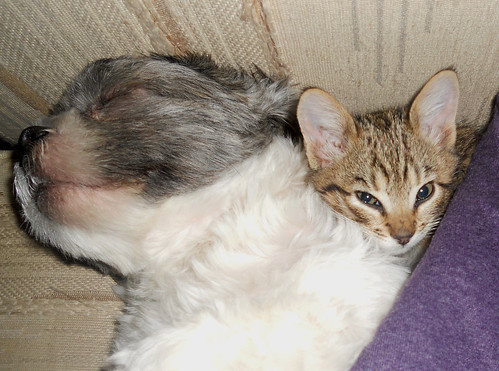|
When you hear organic, most people realize it’s probably the best choice. But do you know why your pet’s food should be organic? Here’s just a few of many reasons.
Helps Keep Your Pet Healthy Organic pet food generally contains higher-quality proteins that your pet needs to thrive. Instead of additives and growth hormones, they are more likely to have only the healthy nutrients your pet should be eating regularly. Keeping your pet healthy means he or she will probably live a much longer, happier life. It Tastes Better In order to be effective, your pet’s food has to taste good or they won’t eat it. Many pets enjoy the taste of organic foods much better than the alternative, as it’s closer to what they would eat in the wild. It’s More Cost-Effective Buying organic food now can save you money later. Healthier pets are more likely to have less vet visits and not as many health issues. You Should Know What Your Pet is Eating Organic pet food labels are often simpler to read with only all-natural ingredients. This means you can tell what your pet is getting by reading the label and avoiding hard-to-pronounce (and digest) unhealthy additives.
0 Comments
 Image (c) Lyn Lomasi; All Rights Reserved Image (c) Lyn Lomasi; All Rights Reserved You're perusing a magazine or website and notice they are holding a contest. Should you enter your pet in a free photo contest? As a pet parent, I've seen these offered many times. Recently, on the advice of a friend, I was reminded to read the fine print and dig deeper before entering my pets into any contests. How do you know if the contest is really the best thing for you and your pet? Consider the source. Does the company pass a scam test? How long have they been around? What is the company's purpose? While contests from smaller companies could certainly be legitimate, if you can find no information on the company, that could be a red flag. Do you really want your pet's photo in the hands of a company who has no visible track record? Look over the rules. Is it clearly laid out what will happen to the photos during and after the contest? Make sure you are comfortable with what's stated. If there are no rules posted, it's probably a better idea not to risk it. You have no idea what they have planned for your pet's photo. The rules need to be clear and they need to be in easy-to-find location. If I can't agree with the rules or even fond them, you can guarantee that my pet's photo is not getting sent to anyone. What is the prize? Check out all of the prize offerings and make sure it is something you and your pet will benefit from. For instance, your pet will not gain anything from a prize consisting of food that he does not eat. If the prize offers stardom for your pet, will it be compensated? Starring in ads, commercials, or magazines should always be compensated. If that is the only prize your pet will receive in the photo contest, think about the company's motives. They may simply be using the contest as a way to avoid paying for pet models and actors. If our pets are photo contest winners, I would want them to reap the most benefits, not me or the contest host. Does your pet like posing? If your pet is not comfortable posing for pictures, don't stress him out just to enter a contest. However, if your pet enjoys the practice, let her soak up the attention of the camera. Remember to have plenty of water, nourishment, and entertainment available if the photo shoot will take a considerable amount of time. Make posing for the photo contest a fun event for your pet. If you just have fun with your pet and don't force it, the experience will be more enjoyable for your both. The hamsters in our family enjoy posing for the camera. That's probably due to the fact that we just let them do their thing and snap away, instead of trying to force them into posing a particular way. Is it something your pet should be paid for? This can be a huge deal-breaker. As mentioned above, some companies hold pet photo contests simply to create PR buzz. If the company is trying to cut down modeling and acting costs by having a contest, is this really a company you'd want your pet working for? If my pet is going to star in a commercial, on a website, in a magazine, or anywhere else, I want them to be compensated fairly. Just like humans should not work for free, neither should animals. They should be fairly rewarded for their efforts. How many photos will 'win'? If you are entering a contest, the number of winners should be much lower than the number of entrants. If everyone who enters is a winner, the contest is likely not very legitimate. Also, watch for companies who ask you to purchase the items your pet is featured in once they win the contest. If your pet is a contest winner, you should not have to pay any money for any reason. Government taxes on a prize are legitimate. But if you are asked to pay anything other than that, you may be the victim of a pet photo contest scam. When entering your pet into a photo contest, it's always important to check all the facts first. While it can be exciting and you want to see your pet's name up in lights, there are many factors to consider first. Choose wisely and your pet has a better chance of something worthwhile should she end up a winner. Jump in and you may end up dealing with more than you bargained for. *I originally published this via Yahoo Contributor Network by Lyn Lomasi, Staff Writer  A love for animals may come naturally for some kids, but not so much for others. Whether your kids show signs of care toward animals or not, it's important to guide and foster it early one. My kids and I are huge advocates for animals, both through journalism and in action. We've physically rescued animals in need and also strive to help them in many ways, both directly and indirectly. Teaching kids to respect animals is a fun and rewarding experience. Visit the local shelters. My kids and I often visit our local shelter and have come home with a few here and there when possible. The stories of shelter animals hold great lessons when it comes to teaching kids about respecting animals. Many of these animals have been abused, abandoned, or neglected due to lack of care and understanding about proper treatment. Parts of their stories will be on the papers attached to their cages. Shelter personnel may even know and share more if asked. We like to visit and give attention to the animals at least a few times every week. The fate of shelter animals is often unknown. While we cannot adopt them all, we feel we can make a great impact in their lives by playing with them and petting them. This at least lets them know they are loved and gives them a small pocket of sunshine, no matter what ends up happening down the road. Observe neighborhood animals. Watching animals in their natural habitats also holds a good lesson. While watching them, explain to the kids how every living creature holds a place in nature. Taking away certain animals upsets the balance of things. While certain animals may be pesky at times, they are needed to sustain life. For instance, spiders creep some people out, but without them, we might have too many flies or other small insects. Squirrels can be backyard pests. But before you write them off, remember that they have a purpose. Like other small animals, they are prey for other animals. But the acorns they bury for food supply can also become trees, which are great for climbing, oxygen, and more. Teaching kids things like this helps them better appreciate and respect the purpose of animals. Expose children to both wild and domesticated animals. Take the kids to wildlife reservations, horse barns, and even just to homes of people with pets. As explained above, animal shelters are also a good location for exposing kids to domesticated animals. Exposing them to both sides of the spectrum gives them a more broad understanding of animals. Allow them to do things like milk a cow, feed chickens, pet a cat or dog, hold rabbits, and more. The more exposure to all of these things, the better. Keep safety in mind, of course. Wild animals, like lions, should be observed from a distance at a zoo or reserve. Teach the kids about the purpose, habits, and nature of all animals while they interact. Get a family pet. Once your kids gain some knowledge about animals and can be gentle with them, adding a family pet can help expand upon the lesson. Visit your local shelter and let them find a pet that matches your child's abilities, as well as your family's unique lifestyle. Some kids will do better with a small animal, like a hamster. Others may fare better with a cat or dog. Caring for a family pet helps children develop a love and respect for animals, as well as more responsibility, in general. *I originally published this via Yahoo Contributor Network |
Pawsitive
|
- Brand Shamans
- Brand Healing
- Inner Healing
-
INTENT-SIVE NATURE
- Content & Brand Elevation
- Healing Jewelry & Talismans
- Bath, Beauty, & Self-Care
- Healing Sessions
- Rituals, Herbs, & Altar Supplies
- Gawwwdess Baby Boutique
- Soul Flame Gifts
- Yoga & Meditation
- Books & Media
- Education & Homeschool Resources
- Home, RV, & Decor
- Clothing
- Pets
- Custom Orders
- Monthly Subscription Boxes
- October Festivals
- FLOW-Key Parenting
- About & Contact
- RV, Nature, & Travel Shamans
- Souls Within
- Life & Home
- Heart 'N Mind Homeschool
- The Homeschooling Mommy
- Books & Authors
- Speak Up!
- Pawsitive Pet Parenting
- Manifesterz
- Gifts In Minutes
- Brand Shamans
- Brand Healing
- Inner Healing
-
INTENT-SIVE NATURE
- Content & Brand Elevation
- Healing Jewelry & Talismans
- Bath, Beauty, & Self-Care
- Healing Sessions
- Rituals, Herbs, & Altar Supplies
- Gawwwdess Baby Boutique
- Soul Flame Gifts
- Yoga & Meditation
- Books & Media
- Education & Homeschool Resources
- Home, RV, & Decor
- Clothing
- Pets
- Custom Orders
- Monthly Subscription Boxes
- October Festivals
- FLOW-Key Parenting
- About & Contact
- RV, Nature, & Travel Shamans
- Souls Within
- Life & Home
- Heart 'N Mind Homeschool
- The Homeschooling Mommy
- Books & Authors
- Speak Up!
- Pawsitive Pet Parenting
- Manifesterz
- Gifts In Minutes



 RSS Feed
RSS Feed



